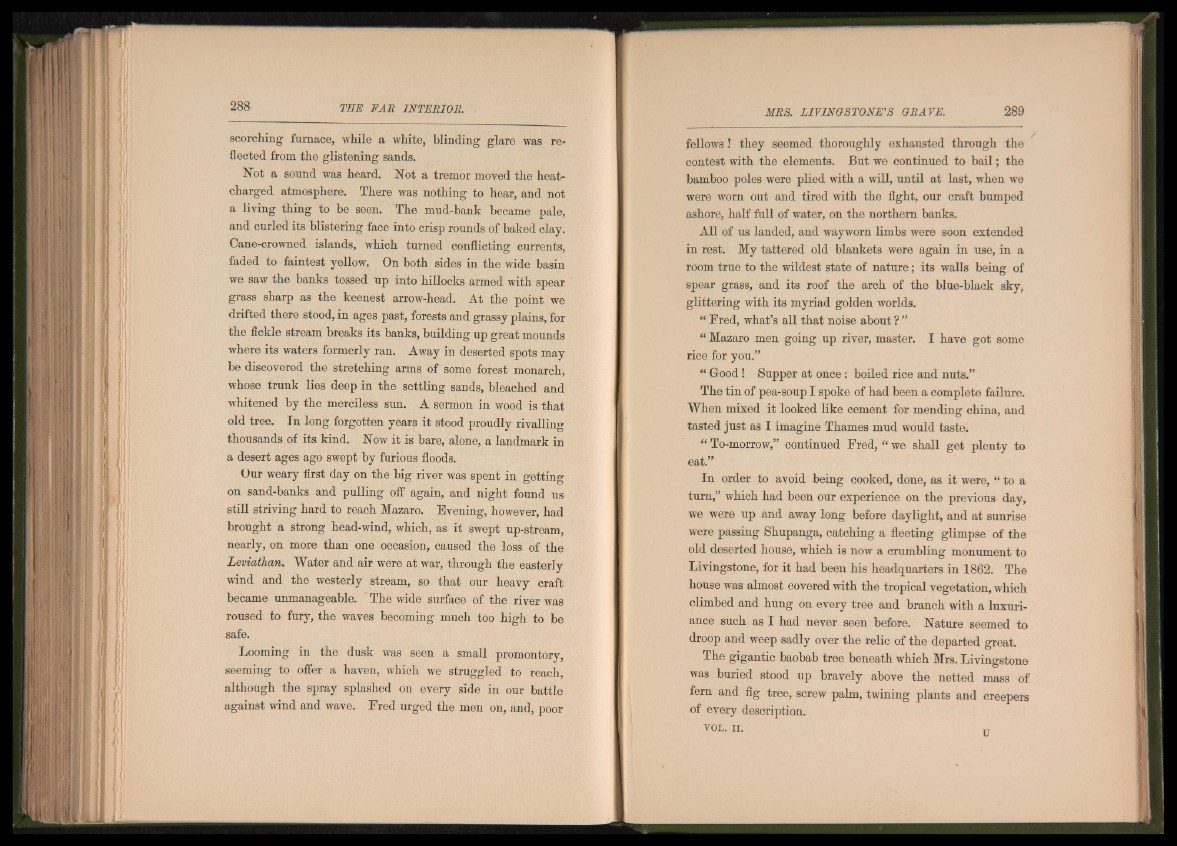
scorching furnace, while a white, blinding glare was reflected
from the glistening sands.
Not a sound was heard. Not a tremor moved the heat-
charged atmosphere. There was nothing to hear, and not
a living thing to be seen. The mud-bank became pale,
and curled its blistering face into crisp rounds of baked clay.
Cane-crowned islands, which turned conflicting currents,
faded to faintest yellow. On both sides in the wide basin
we saw the banks tossed up into hillocks armed with spear
grass sharp as the keenest arrow-head. At the point we
drifted there stood, in ages past, forests and grassy plains, for
the fickle stream breaks its banks, building up great mounds
where its waters formerly ran. Away in deserted spots may
be discovered the stretching arms of some forest monarch,
whose trunk lies deep in the settling sands, bleached and
whitened by the merciless sun. A sermon in wood is that
old tree. In long forgotten years it stood proudly rivalling
thousands of its kind. Now it is bare, alone, a landmark in
a desert ages ago swept by furious floods.
Our weary first day on the big river was spent in getting
on sand-banks and pulling off again, and night found us
still striving hard to reach Mazaro. Evening, however, had
brought a strong head-wind, which, as it swept up-stream,
nearly, on more than one occasion, caused the loss of the
Leviathan. Water and air were at war, through the easterly
wind and the westerly stream, so that our heavy craft
became unmanageable.. The wide surface of the river was
roused to fury, the waves becoming much too high to be
safe.
Looming in the dusk was seen a small promontory,
seeming to offer a haven, which we struggled to reach,
although the spray splashed on every side in our battle
against wind and wave. Fred urged the men on, and, poor
fellows ! they seemed thoroughly exhausted through the
contest with the elements. But we continued to b a il; the
bamboo poles were plied with a will, until at last, when we
were worn out and tired with the fight, our craft bumped
ashore, half full of water, on the northern banks.
All of us landed, and wayworn limbs were soon extended
in rest. My tattered old blankets were again in use, in a
room true to the wildest state of nature; its walls being of
spear grass, and its roof the arch of the blue-black sky,
glittering with its myriad golden worlds.
“ Fred, what’s all that noise about ? ”
“ Mazaro men going up river, master. I have got some
rice for you.”
“ Grood! Supper at once: boiled rice and nuts.”
The tin of pea-soup I spoke of had been a complete failure.
When mixed it looked like cement for mending china, and
tasted just as I imagine Thames mud would taste.
“ To-morrow,” continued Fred, “ we shall get plenty to
eat.”
In order to avoid being cooked, done, as it were, “ to a
turn,” which had been our experience on the previous day,
we were up and away long before daylight, and at sunrise
were passing Shupanga, catching a fleeting glimpse of the
old deserted house, which is now a crumbling monument to
Livingstone, for it had been his headquarters in 1862. The
house was almost covered with the tropical vegetation, which
climbed and hung on every tree and branch with a luxuriance
such as I had never seen before. Nature seemed to
droop and weep sadly over the relic of the departed great.
The gigantic baobab tree beneath which Mrs. Livingstone
was buried stood up bravely above the netted mass of
fern and fig tree, screw palm, twining plants and creepers
of every description.
v o l. i i . n